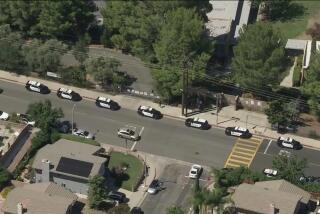Clergymen Answer Call to Save Children From Drugs
- Share via
INGLEWOOD — Police Chief Raymond L. Johnson asked the city’s religious leaders this week to use their influence to steer young people away from crime and drugs.
“You can reach out to our young people like no one or nothing else can,” Johnson told about 70 church leaders.
Too Late
“You can touch them while I cannot. By the time I touch them it is too late because we are already putting them behind bars,” he said, drawing a round of “Amens” and “Praise the Lords.”
Most of the clergy, who represented nearly all colors and creeds and displayed the kind of enthusiasm seen at revivals and prayer rallies, said they looked forward to working closer with the police,
“We are going to have to get out of our pews and into the arena,” said the Rev. Luther Keith of the Central Baptist Church, wagging a finger at his peers. “We as churches are going to have to rise up or we are going to lose a generation of our children to drugs and crime.”
Indeed, various statistics indicate that a startling number of Inglewood youths are experimenting with drugs. Roughly 34% of Inglewood High School’s 500 seniors said they saw no harm in experimenting with cocaine, according to a nationwide survey of high school seniors conducted in 1985. (Police officials noted that the study was conducted before the well-publicized cocaine-related deaths of athletes Len Bias and Don Rogers).
About a fifth of that class said they had used cocaine during the school year. Just five years ago, less than 1% admitted using the drug, police said.
Police attribute the rise in drug usage among high school students to the increased availability of drugs--particularly “rock” cocaine, an extremely addictive form of the drug also known as “crack” that is smoked instead of snorted through the nostrils.
Street Sales
Until a police clampdown last summer, several drug markets emerged in Inglewood neighborhoods with street dealers hawking crack and other drugs on street corners and in alleyways.
“It got to the point where buying crack was as easy as driving down the right street,” Johnson said at the time. “You didn’t even have to get out of your car and the whole transaction would take just a matter of seconds. And the kids are a big part of our problem.”
A massive undercover task force has helped to close some of the so-called “stop and cop” drug markets on Inglewood streets but it has done little to reduce drug use in the city’s schools, police said. Police estimate that junior high- and high school-age youths account for as much as a quarter of the city’s drug dealers.
“Our children are going to go right on using drugs unless we provide them some more positive role models and give them something else to do in their free time beside using drugs,” Johnson told the clergy.
He maintained that reducing adolescent drug usage will lower the Inglewood Unified School District’s 42% dropout rate and help lessen other problems such as teen-age pregnancy and juvenile crime.
“That is where you come in,” Johnson told the audience. “You can provide the leadership our children need.”
Johnson and members from the Police Department’s community affairs division suggested that churches provide drug counseling and after-school and summer activities for children. He also recommended that churches join block clubs and Neighborhood Watch groups and encourage their congregation members to do the same.
Representatives from nearly all of Inglewood’s 78 churches attended the meeting Tuesday morning at City Hall, along with several Inglewood residents who lead congregations outside the city.
“If this turnout is any indication, the churches of this city are more than willing to work with the Police Department to make this city a better place to live, work and worship in,” said Pastor Anthony Paschal of the Miramonte Seventh-day Adventist Church.
The meeting with Inglewood’s church leaders was part of an overall effort to get the community more involved in crime prevention and enforcement, said Johnson, who was hired in May. Johnson and other police officers plan to meet with church leaders on a monthly basis.
More to Read
Sign up for Essential California
The most important California stories and recommendations in your inbox every morning.
You may occasionally receive promotional content from the Los Angeles Times.













